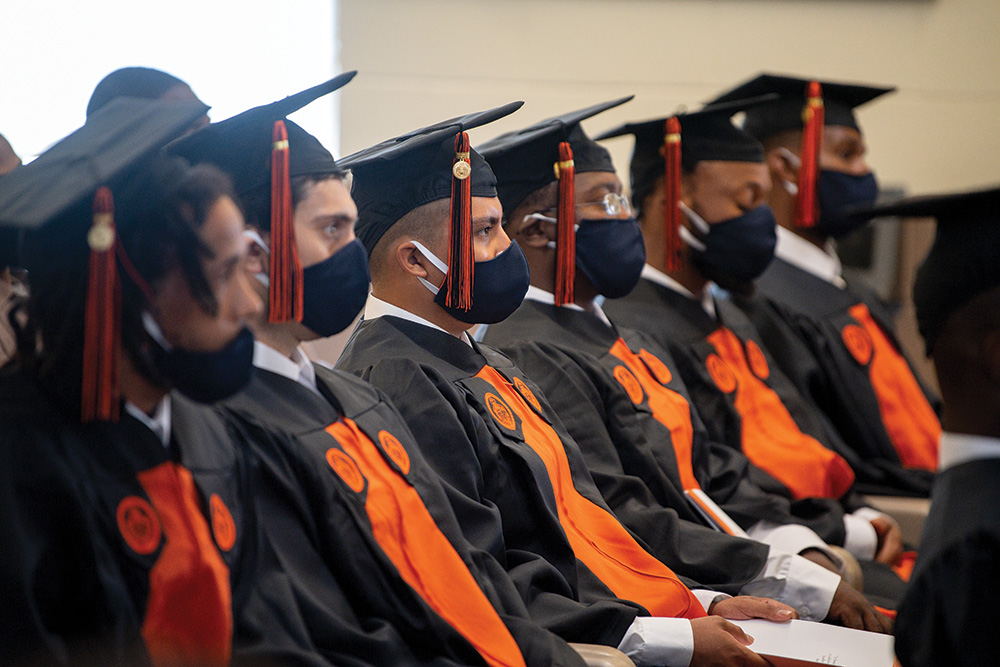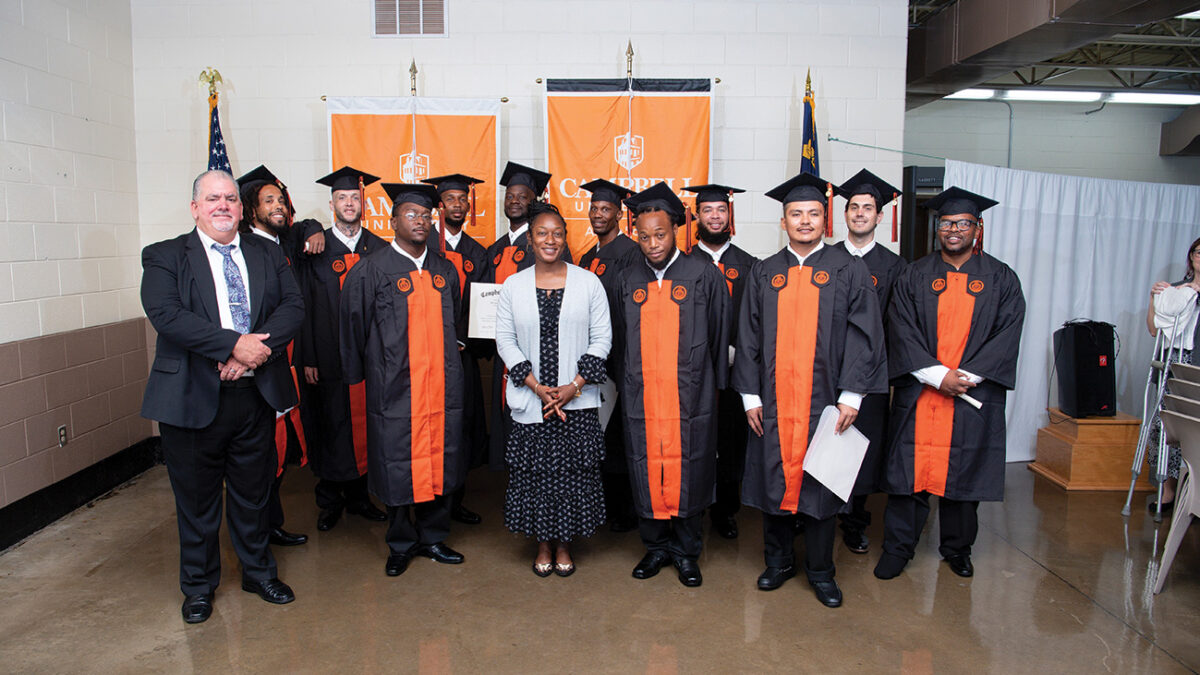The 11 graduates of Campbell’s first class at Sampson County Correctional Facility stand for a photo with warden Robert Van Gorder and case manager Mahogani Thompkins, both of whom have played a big role in supporting the students during their academic journeys.
Jamel Byrd transferred to Sampson County from Pamlico County Correctional Institution in 2018 after he answered a statewide call to take part in the Campbell program. He didn’t get there quick enough, missing out on a chance to be in the first class when the final roll was complete.
He was 40 at the time. He had been in prison for nearly 23 of those years.
In that time, Byrd has been conditioned to a prison environment. According to the Prison Policy Initiative, a nonprofit, non-partisan group aimed at exposing the broader harm of mass criminalization, many of the “defining features” of incarceration — disconnection to family, loss of autonomy, lack of purpose, unpredictability of surroundings — are linked to negative mental health outcomes.
“I’ve been around a lot of negative people,” Byrd says, “people who don’t really have any goals or don’t want to do anything with their lives. It’s like we’re in this same cycle we’ve been in, and there’s no getting out of it.”
Days after receiving the bad news, he learned that one of the students who did get in was being transferred to another facility.
Byrd’s moment had arrived.
“When they asked me if I wanted the spot, I had a big smile on my face,” he says. “I realized I was about to get into something really beautiful, something that was going to help me out. Something that was going to help me when I get out.
“I’m old now. I’ve been here since I was a teenager. This was a magical moment.”
There were professors who jumped at the chance to be part of the program, too. Dr. Sherry Truffin, professor of English and chair of Campbell’s Honors Program who taught English 101 and 102 at Sampson, says her faith played a big role in her involvement from the beginning.
“I’m an Episcopalian, and the church has a standard liturgy, the Prayers of the People, where we pray for families, communities, leaders of nations, prisoners and captives and those who remember and care for them,” she says. “Here was an opportunity to be one of those people, so it definitely appealed to me.”
Truffin also has a sister who served time. She knew going in that incarcerated men and women are often a misunderstood group.
“They’re in a very depersonalized, dehumanized environment,” she says. “I know now they’re exceptionally motivated, exceptionally hard working and very aware that access to a program like this is a privilege. They want to do well and become role models for their children. They want better futures for their families. They want to encourage their kids to go to college someday, and if they can complete a degree while they’re incarcerated, that’s a good step.”
Truffin led the small faculty procession while carrying the University mace at the commencement ceremony in August — there were no speakers to play “Pomp and Circumstance,” so some of the professors hummed it. She admits to getting emotional that day and tearing up as each student walked up to the podium for their diploma. She got as much out of the experience as her students, she says.

The percentage of incarcerated men and women in prisons throughout the United States who have just eight or fewer years of education. Many believe education is the key to reducing the nation’s recidivism rate. A recent study by Emory University found that an associate degree drops the rate to nearly 14 percent. A bachelor’s degree reduces it to just under 6 percent. And for those who earn a master’s degree: nearly 0 percent.
“It’s just really been a privilege to teach students who understand that education is a privilege,” she says. “Not all students in college really understand what it means to have access to higher education. I’ve joked that it’s hard sometimes to come back to main campus and hear students complain about walking across campus in the rain and through puddles to get to class. I want to tell them, ‘You have no idea what some students are going through to get this access to education.’ And I understand an 18-year-old college freshman needs a different kind of support and guidance than a 27-year-old freshman who’s been incarcerated.
“They’ve decided it’s about ‘us.’ We’re going to get through this.”
Jamel Byrd says his first two years have taught him how to communicate better with others. He relates better to those he previously didn’t understand — those, he says, who have goals and ambitions and want something more out of life. He gets it now.
“People will misunderstand and fear me [because of my past], but I’m better equipped to meet them head on and relate to that better,” he says. “People have this perception that criminals are nothing, they’re the undesirables. I want to help them overcome that mentality and tell them, ‘Hey, I’m not bad.’
“My education has transformed me. My family has transformed me. My God has transformed me.”
“But sometimes I’ll have such a great discussion on a reading assignment in the Sampson class, and I’ll come back to main campus and find that several students didn’t do the reading. I want to say, ‘Man, these guys are putting you to shame.’”
“There was a real selflessness to their work, because they felt like they needed to be successful so that this opportunity would be available to the people coming up after them.”
Truffin is measuring the success of the prison program not by the numbers, but by the growth in confidence and positive attitudes displayed by this first group over the last two years. In that time — despite stretches of instability brought on by the COVID-19 pandemic — she’s seen her students become more willing to express their thoughts and share ideas. She’s seen an improvement in their writing skills. She’s seen a real selflessness in their work, because they know their success will have a bearing on whether or not future students will have this opportunity.
“That to me is a measure of the success of the program,” Truffin says. “That it means enough for them to work through the obstacles they faced for goals bigger than themselves.”
Those obstacles proved to be daunting. COVID-19 not only put a lengthy halt to in-person communication with professors, just about every student in the program contracted the virus at some point during the first year. The students were not allowed internet access, as per prison rules, meaning research was performed the old-fashioned way, except with very limited access to research materials.
Most of all, there was the challenge of attending class, studying and getting the work done while living in a prison environment. To Timothy White, who is 12 years into a 19-year sentence, being a student meant carrying a target on your back when classes first began.
“Look, there were only 15 of us — now just 11 — out of a 450-man campus, so there was a lot of jealousy and envy, or whatever you want to call it, and not just from the prisoners,” White says. “So you go through that every day, and you realize they’re either with you or against you. And there’s only a few who are with us … most of them are sitting beside me right now.”
“They’re envious of the opportunity we have, because essentially, we’re getting a free ride,” adds Kevin Cook. “We’ve got a four-year scholarship at a prestigious school, and there are people who’d sell their house for something like this. We get it for free, and we’re in prison. There are people who don’t want to see us doing this.”
Sampson County Correctional Institution Warden Robert Van Gorder has worked in the prison for 30 years, starting in 1991 as a correctional officer and working his way to the top in 2019. He understands, more than just about anyone, what can motivate an inmate and what can change an environment for the better in a prison setting.
He says Campbell University’s impact on the students has been dramatic. More than that though, in just two years, the program is having a positive impact on many of the 400-plus other men who aren’t enrolled.
“In the very beginning, we had 15 loners. Individuals. They were in it for themselves. They were just looking to see what they could get out of it, which is understandable. For the most part, there’s not a whole lot of legitimate teamwork among offenders in a prison,” Van Gorder says. “But I’ve watched these young men grow up as human beings and learn that it’s not just about them anymore. It’s about ‘us.’ I have access to security videos, where I can make the rounds across the facility without leaving my desk. And I thought it was interesting when I saw these men sitting around tables studying together on a Saturday or Sunday night. Not one at a time, but you know, eight or nine of them sitting together.
“You go to prison, and our society says, ‘Lock ’em up and throw away the key.’ But we can change that attitude.”
“They’ve decided it’s about ‘us.’ We’re going to get through this.”
Jamel Byrd says his first two years have taught him how to communicate better with others. He relates better to those he previously didn’t understand — those, he says, who have goals and ambitions and want something more out of life. He gets it now.
“People will misunderstand and fear me [because of my past], but I’m better equipped to meet them head on and relate to that better,” he says. “People have this perception that criminals are nothing, they’re the undesirables. I want to help them overcome that mentality and tell them, ‘Hey, I’m not bad.’
“My education has transformed me. My family has transformed me. My God has transformed me.”


